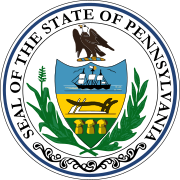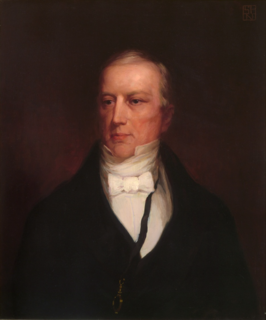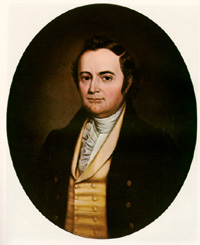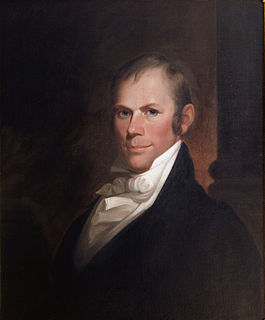At some point in 1826, Joseph Hemphill (J) of Pennsylvania's 2nd district resigned from Congress. [1] A special election was held to fill the resulting vacancy.
| Elections in Pennsylvania |
|---|
 |
At some point in 1826, Joseph Hemphill (J) of Pennsylvania's 2nd district resigned from Congress. [1] A special election was held to fill the resulting vacancy.
| Candidate | Party | Votes [2] | Percent |
|---|---|---|---|
| Thomas Kittera | Anti-Jacksonian | 2,399 | 55.0% |
| Henry Horn | Jacksonian | 1,961 | 45.0% |
Kittera took his seat at the start of the Second Session of Congress. [3]

The 1826 and 1827 United States House of Representatives elections were held at various dates in each state in 1826 and 1827 during John Quincy Adams's presidency.

The 1824 and 1825 United States House of Representatives elections were held at various dates in different states between July 1824 and August 1825, coinciding with the contentious 1824 presidential election. After no presidential candidate won an electoral majority, in February 1825 the House of the outgoing 18th Congress chose the President in a contingent election.

The 1818 and 1819 United States House of Representatives elections were held at various dates in different states between April 1818 and August 1819 during President James Monroe's first term. Also, newly admitted Alabama elected its first representatives in September 1819.

The 1808 and 1809 United States House of Representatives elections were held at various dates in different states between April 1808 and May 1809 as James Madison was elected president.

On March 12, 1815, a few days after the legal start of the 14th Congress, but long before the first meeting of that Congress, David Bard (DR), who'd been re-elected to the 9th district, died. A special election was held on October 10 to fill the vacancy left by his death.

In the 1816 elections in Pennsylvania, David Scott (DR) won one of the two seats in the 10th district, but resigned before the 15th Congress began, having been appointed judge of the court of common pleas. A special election was held on October 14, 1817 to fill the resulting vacancy.

During the 15th Congress, there were two special elections in the 6th district of Pennsylvania, both held in the year 1818. The 6th district at that time was a plural district with two seats, both of which became vacant at different times in 1818. The first vacancy was caused by John Ross (DR) resigning on February 24, 1818 and the second was caused by Samuel D. Ingham (DR) resigning July 6.

On April 20, 1818, Jacob Spangler (DR) resigned from Congress, where he'd represented Pennsylvania's 4th district. A special election was held that year to fill the resulting vacancy.

On January 1, 1818, a special election was held in North Carolina's 7th district to fill a vacancy left by the death of Representative-elect Alexander McMillan (F) before the 15th Congress had assembled.

On November 7, 1818, a special election was held in North Carolina's 11th district to fill a vacancy caused by Daniel M. Forney (DR)'s resignation earlier that year.

On April 20, 1818, Thomas B. Robertson (DR) of Louisiana's at-large district resigned. A special election was held to fill the resulting vacancy.

On May 15, 1820, David Fullerton (DR) of Pennsylvania's 5th district resigned from his seat in the House of Representatives. A special election was held on October 10, 1820 to fill the resulting vacancy. This election was held on the same day as the election for the 17th Congress.

On November 3, 1817, John C. Calhoun (DR) of South Carolina's 6th district resigned upon being appointed Secretary of War. A special election was held for his replacement

In April, 1821, prior to the first meeting of the 17th Congress, Representative-elect James Duncan (DR) from Pennsylvania's 5th district resigned. A special election was held to fill the resulting vacancy on October 9, 1821.

On July 20, 1821, William Cox Ellis (F) from Pennsylvania's 10th district resigned. A special election was held to fill the resulting vacancy on October 9, 1821.

On May 8, 1822, the last day of the First Session of the 17th Congress, William Milnor (F) of Pennsylvania's 1st district resigned. A special election was held to fill the resulting vacancy on October 1, 1822, a week before the general elections for the 18th Congress.

On May 8, 1822, the last day of the First Session of the 17th Congress, Henry Baldwin (DR) of Pennsylvania's 14th district resigned from Congress. A special election was held on October 1, 1822 to fill the resulting vacancy.

On May 20, 1822, Samuel Moore (DR) of Pennsylvania's 6th district resigned. A special election was held on October 1, 1822 to fill the resulting vacancy.

On October 17, 1822, Ludwig Worman (F) of Pennsylvania's 7th district died in office. A special election was held to fill the resulting vacancy on December 10, 1822

On August 26, 1825, before the first session of the 19th Congress began, James Allison, Jr. (J) of Pennsylvania's 16th district resigned. A special election was held to fill the resulting vacancy.